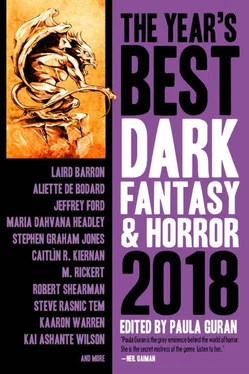What possesses me? I’m calm. I take her money. The gratuity is twenty percent on the nose. I unlock the drawer that holds my silver pistol and take it out and put it on the counter, the business end pointing in her direction. Her eyes turn the size of saucers.
“I want to see your home,” I say. I stick the gun in my large, floppy handbag. Exhaling in gusts, she says, “Dorrie? What are you doing?”
“I won’t scare your girl,” I say, nestling the pistol against the debris in my bag. “She won’t see this, unless you refuse to do as I ask.” I need to absorb the dwelling that might have been mine, what it looks like, feels like; I want to observe, via Charlotte’s room, how Alicia might be enlivening her own space. The one upstairs is stuck in time.
Charlotte bounces back to us, haloed with the lavender from the bathroom’s soap dispenser. There are three tote bags of presents.
“Good thing there’re three of us!” I trill. “I’m free to help you carry the gifts to your house. It’s a way to keep the party from ending.” I keep one hand in my purse, as if I’m about to pull out my wallet. Betty’s mouth stays open.
“Oh,” says Charlotte. “That’s nice.” But she’s watching her mother and says, “Momma?”
“Yes, my sweetheart,” says Betty/Bird. A damp patch blooms on her white shift. She bends to kiss her daughter’s head. “Let’s go home.”
Out we go, and I fumble with the outer lock, and as Betty glances around, I bring my purse around to face her, and she freezes. Charlotte is merry from the festivities.
I don’t get out much. The air is crisp with fall, spiced and reddened and golden. People stride by, in a hurry. The sidewalk is cracked. “Slow down,” I hiss at Betty.
After a tiny yelp, she starts shaking. She whispers, “I would have invited you. I don’t understand. I would have invited you over.”
“That’s not true,” I say.
Charlotte, carrying the lightest tote bag, stops to adjust it on her shoulder.
“Did you have a lovely birthday?” I ask her.
“The best ever, Mrs. Dias,” she says. Her spider barrette catches a glint. “Thank you so much.”
Betty, color drained, begins to hyperventilate and gasps at me, “I don’t understand.”
“Charlotte,” I say, “didn’t you promise me a picture? Why don’t we get it, once we get home?” The child is slowing, staring at the grownups.
“But I haven’t done one specially for you,” she says.
“How about if you pick one you’ve already done, and I can have that?”
She weighs this and speaks with caution. “All right. Momma, what’s wrong?”
My hand rides the pistol, cool, silver. The poor woman loses the starch in her knees and buckles. “Momma!” Charlotte shrieks.
“She’s fine,” I say, gripping her arm to help her along. “It’s just a little too much champagne.”
“That’s right,” croaks Betty. “We’re almost home, honey.”
They live close but at a remove from the racket of the bars. An Indian market offers its scents of turmeric, star anise, and cumin; the fruits on display shine like jewels. I’m a mite faint myself. A boy on a phone jostles Betty, and her cry is sharp and anguished. Charlotte becomes more puzzled. She pats her mother fondly on her back. Leaves scratch the asphalt, and the tips of midtown peer over the streets to watch. The fear in Betty’s eyes has infected her whole being, saturating her. She’s quivering. Charlotte puts an arm around her mother and seems to be humming, singing. I had to witness a child giving comfort, a mother and daughter bound together to defy terror, while at the same time I protect the girl from the worst of it.
Their doorman in his cap and jacket with golden frog-closures leaps forward to help with the packages. I blurt, “No, we’re fine!”
“Mrs. Lezardo?” he says.
“We’re okay, Ralph. Thank you.” Betty looks ejected from a wind tunnel, and her daughter guides her ahead. My hand trembles on the gun.
Betty collapses into sniffling in the elevator as we shoot up to a top—but not the top—floor. There are mirrors and elegant brass trim, and the unscratched wood is polished. I adjust the angle where I stand to keep the pistol in my bag trained on her. Charlotte hasn’t registered how steadily I’ve kept my hand out of view.
And then at their threshold—her reaction is worse than I expected—Betty shoves the key in her lock after the fourth try and cracks, disintegrates into a shambles, weeping. She genuflects from trembling and drops her tote bag. I scoop it up. Charlotte bleats, “Momma, are you sick? What’s wrong? What can I do? What happened?” Her pleading eyes on me, she beseeches, “Help us. Help me.”
My turn to shake, rendered speechless. Did some disturbed part of me long to see a cheap imitation of my Alicia’s fear and worry in her last hour, so I could heal it? “Let’s go inside and get her some water.” I can’t look at Charlotte; I’m propelled forward despite knowing I should bolt.
Disappointingly predictable: It is in fact my dream apartment. Large and open, lined with books, flooded with light. The large kitchen at the far end has bar stools so dinner company can chat over appetizers as Betty watches the water boil for pasta. Corked bottles of wine display various levels, half, or a few fingers remaining, or three-quarters, rich purple-reds. How do Betty and her husband Vincent not hear them screeching, Drink Me? Under one of those netted domes to deflect insects is a plate of cookies… Don’t they shriek, Eat Me? In the adjacent dining area, the chairs are wrapped in beige cloth with ties behind them to resemble the backs on the dresses of bridesmaids. An office is visible off to the side, a laptop open. More rooms farther down a hallway. A spiral staircase to a loft.
Crayoned pictures on the living-area wall. I venture slightly out of Betty’s range as I inspect them. A blue cat floats in a sea of red water. I fall in love. What’s in Charlotte’s childhood realm; what are her toys, dolls, books, paints? But I can’t explore that and still keep Betty at bay. I can’t maintain a gun trained on her from another room. She’s slight, but fear might impart the strength she needs to disarm me, or worse.
“I would have invited you in!” Betty shouts, dropping onto the plush red sofa. She unleashes a fresh wave of sobs.
“Momma!” Charlotte screams, and then it happens, what I’ve wanted to see, what I half-sensed—and didn’t—was my reason for doing this worst thing of my life: Charlotte hugs her tight, and Betty clutches her as if she’ll die if she doesn’t and swings her daughter to a tucked-away point, to protect her. “Go to your room, Char,” she whispers.
“Not while you’re sad. I love you, Momma! Don’t cry! What’s wrong? I love you!”
“I’m good,” Betty whispers. “Baby, don’t you worry. I’ve got you.”
I take my hands out of my purse and it’s my turn to crumble, into a Lucite chair with a stylish decal of a teenaged girl with standing-up cobalt hair. There was a lot of pure hate in what I did, I’m aware of that: Such a perfect existence you have, Betty; it’s a replica of the reel I starred in, inside my brain in my youth. What do you look like when you might be in danger of loss?
But mostly: How else can I enact some message to my Alicia that she’s the only one I wanted to comfort me in those days and weeks and months when I sobbed and shook and couldn’t face the terror? What might it look like, my child holding me when I’m afraid, sickened by the world’s violence? She holds me and begs me not to be shattered because she’s here, here to stop my grief. I’ve wanted her consolation.
Does anyone fathom what it’s like to be scared every second walking down the street, afraid a monster will lunge? No wonder I seldom go out.
Читать дальше












